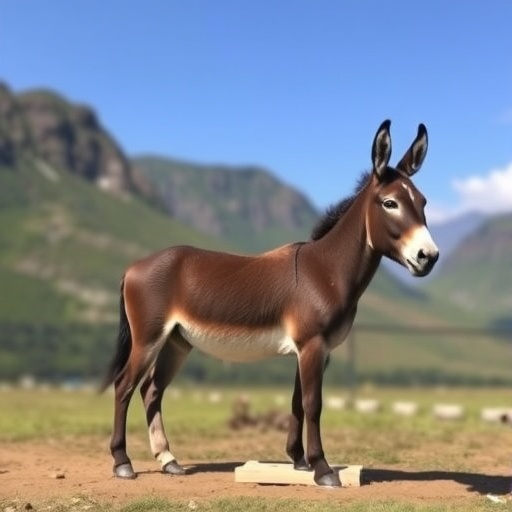In a groundbreaking study, researchers have conducted an extensive whole-genome analysis that sheds light on the genetic diversity and evolutionary pressures faced by Sichuan donkeys. This significant research reveals fascinating insights into the genetic makeup of this unique equine species, which has adapted to the specific environmental conditions found in the Sichuan region of China. Through thorough genomic assessment methods, the team has uncovered the complexities of the genetic variations that contribute to the overall health and resilience of these animals.
Sichuan donkeys, known for their remarkable endurance and adaptation capabilities, have been integral to the agricultural practices and cultural heritage of the region. However, increased industrialization and changing land usage patterns have put these animals at risk of genetic dilution and loss of vital traits. The researchers embarked on this study with the aim of elucidating the genetic basis of such traits, ensuring that future conservation efforts remain informed by robust scientific data.
The methodology adopted for this analysis involved the collection of DNA samples from a diverse range of Sichuan donkeys, ultimately resulting in a dataset that encompasses the genomes of numerous individuals. Advanced sequencing technologies were employed to provide a comprehensive view of their genetic code. This level of scrutiny allowed the researchers to identify single nucleotide polymorphisms (SNPs) and other variations that are indicative of adaptation to local environmental stresses.
The genetic diversity observed within the Sichuan donkey population was unexpectedly high, suggesting that these animals have maintained genetic variability despite potential threats from external pressures. Such variability is crucial for the species’ long-term survival and adaptability. The study revealed that, while isolation may present challenges, it also enables the preservation of unique genetic traits vital for resilience against environmental changes.
In addition to uncovering genetic diversity, the researchers delved into the selection pressures that have shaped the Sichuan donkey’s genome over time. Genes that played a role in stress response and metabolic adaptation were highlighted as having significant selection signatures. This insight indicates that these donkeys have evolved mechanisms to thrive in the diverse climatic conditions of the region, demonstrating a remarkable evolutionary response to their environment.
Understanding the genetic underpinnings of these adaptations is valuable, not only for the conservation strategies aimed at preserving the Sichuan donkey but also for potential applications in equine breeding programs. By identifying critical genetic markers, breeders could enhance desirable traits and promote genetic health in related equine populations. The research team emphasizes the necessity of integrating such findings into broader conservation efforts to ensure the longevity of this vital breed.
The implications of this study extend beyond the immediate fate of Sichuan donkeys. The methodologies developed through this whole-genome analysis can serve as templates for similar studies on other equine species facing genetic threats. By employing comprehensive genomic techniques, researchers worldwide can assess the health of various horse populations and contribute to global equine conservation strategies.
Moreover, this study underscores the importance of preserving not just the animals but also their genetic heritage. As indigenous breeds like the Sichuan donkey face modern challenges, understanding their genetic legacy will play a critical role in maintaining biodiversity. In an era where many species are losing their genetic footprints due to anthropogenic pressures, this research serves as a vital reminder of the need for active conservation efforts.
The fascinating genetic findings not only enrich our understanding of the Sichuan donkey’s heritage but also open new avenues for research into equine health. As the study continues to garner attention, it has sparked discussions on the broader implications of genetic diversity in farm animals and the critical need for preserving indigenous breeds. With the ongoing threats posed by climate change and habitat destruction, studies like this one emphasize the intersection of genetics and conservation in an ever-evolving world.
As more institutions recognize the importance of integrating genomic data into conservation practices, the resultant strategies will hopefully lead to more effective management of endangered breeds. The lessons learned from the Sichuan donkey can be applied to various species, ensuring that we remain vigilant in our commitment to biodiversity.
In conclusion, this groundbreaking research offers a compelling glimpse into the genetic world of the Sichuan donkey, highlighting the vital role of genomic studies in conservation. The revelations regarding genetic diversity and adaptive pressures shed light on not only the resilience of this breed but also the broader narratives surrounding animal evolution and protection. The findings promise to inform future advancements in both scientific understanding and practical conservation efforts, ensuring that generations to come can appreciate the unique heritage of the Sichuan donkey.
Subject of Research: Sichuan donkey genetic diversity and selection pressures
Article Title: Whole-genome analysis reveals genetic diversity and selection pressure in Sichuan donkey
Article References:
Li, C., Han, J., Chang, T. et al. Whole-genome analysis reveals genetic diversity and selection pressure in Sichuan donkey.
BMC Genomics 26, 1072 (2025). https://doi.org/10.1186/s12864-025-12254-w
Image Credits: AI Generated
DOI: https://doi.org/10.1186/s12864-025-12254-w
Keywords: genetic diversity, Sichuan donkey, whole-genome analysis, conservation, equine genetics, evolutionary pressures
Tags: adaptation of donkeys to environmental conditionsadvanced sequencing technologies in genomicsagricultural significance of Sichuan donkeysconservation of donkey traitsevolutionary pressures on donkeysgenetic diversity in equinesgenetic resilience in equine speciesgenomic assessment methods in animalsimpact of industrialization on donkey geneticspreserving cultural heritage through animal geneticsscientific data for conservation effortsSichuan donkey genome analysis





